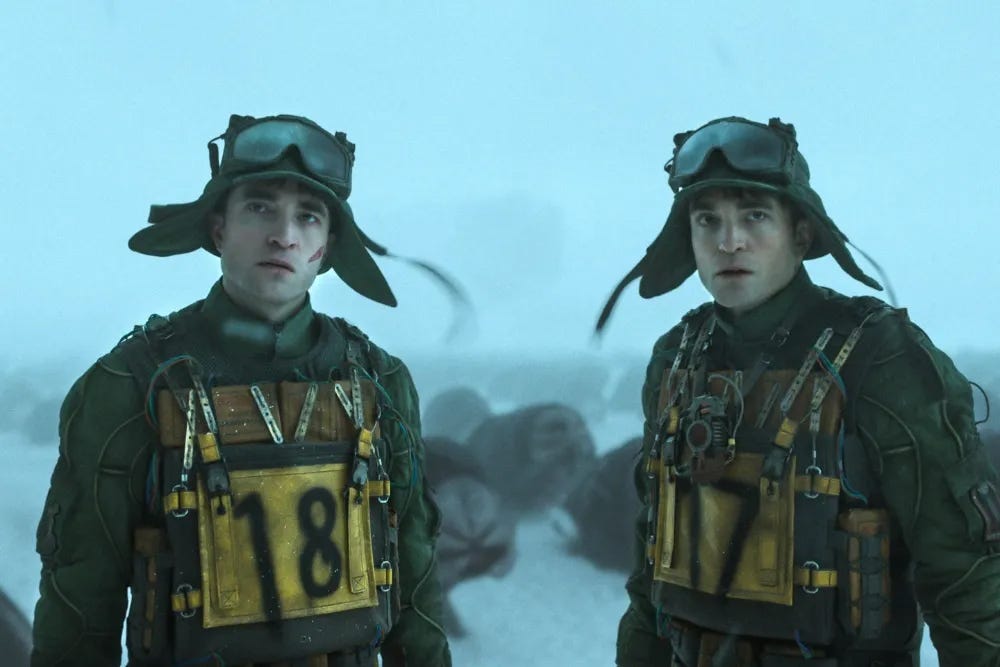Robert Pattinson's performance(s) keep Mickey 17 entertaining despite an uninspired mix of sci-fi and satire.
Social satire in Bong Joon-ho's follow-up to Parasite is played too broadly and on-the-nose to have much bite.
Robert Pattinson might be the most interesting actor with leading-man charisma working today, because he seems far more interested in taking risks than maintaining a leading-man career. In Mickey 17 he plays several variations on essentially a dumb guy stumbling through life, with one variation being more or less an asshole. While Pattinson became a star with his seductive eyes in the Twilight series, he reminds me why he’s one of my favorite actors with his cock-eyed shit-eating grin in Mickey 17. His always-entertaining performance at times seems effortless, despite being it being physically demanding (including pratfalls). You probably already know all of this, which is one reason you’ve decided to see Mickey 17 regardless of this review.
The other reason you had already decided to see Mickey 17 is that it is Bong Joon-ho’s follow up to the Palm d’Or and Best Picture Oscar winning Parasite. You know that Bong is capable is delivering an unconventional English-language genre film (Snowpiercer, 2013), and you know that he can combine sci-fi with social commentary (The Host, 2006; Okja 2017). But can he deliver a more conventional science fiction film with social commentary?
Well, in a sense, that is what he has done with Mickey 17, for better or worse. While undeniably entertaining, Mickey 17 doesn’t have the same surprises and fresh ideas seen in the films mentioned above. In several ways it reminded me of a 1970s episode of Doctor Who (and 1970s sci-fi in general). But hey, I like Doctor Who (Tom Baker is my Doctor) so that in itself is not an insult.
Where Mickey 17 falls short is in its on-the-nose social and political satire, which plays far too broadly to be sharp or insightful. To use a more contemporary Doctor Who comparison, have you seen the 2018 episode “Arachnids in the U.K.” where Chris Noth plays a Trump-like businessman who is just as much a problem as the threat of giant spiders? Well, add a little old-time religion and white supremacy in the mix, and you get Mickey 17’s villain, Kenneth Marshall (Mark Ruffalo), a charismatic politician-turned-interplanetary-mission-leader. (Wait, how does that career path work?)
Pattinson plays Mickey Barnes, who must get on-board for Ruffalo’s colonizing mission to the planet Nilfheim (whose name parallels its origins in Norse mythology) in order to escape certain death at the hands of a loan shark. Mickey has no real qualifications, so he signs up to be an “Expendable” on the mission. “Multiples,” produced by advanced cloning technology have been banned for use on Earth, but they are permitted on dangerous missions to other planets. So Mickey’s job as an Expendable is to perform tasks that are not only risky, they most certainly will kill him. After he dies, a new Mickey body is printed off, and Mickey’s memories and personality (to varying degrees of accuracy) are transferred to the new body. Thus, Mickey 2 through Mickey 17.
Mickey discovers a secret about the bug-meets-armadillo inhabitants of Nilfheim, ignorantly nicknamed “Creepers” by Marshall, which seem to be a threat to the colonizing mission. But Mickey is too dimwitted to realize the ramifications of what he’s discovered until it is explained to him much later in the film. So we have the classic dual Doctor Who plot from the 1970s: the “monster” threat on the one hand, and the misguided political leader/businessman/bureaucrat/scientist/villain whose hubris-filled misunderstanding of the situation could lead to disaster unless someone stages a revolt or mutiny.
Of course, something goes wrong with the duplicating procedure, leading to two living Mickeys, 17 and 18, which is forbidden. So the Mickeys have to escape punishment and survive (each other) as the exterior threat escalates. All of this is a lot of fun, despite the lack of originality.
The problems with the social and political satire in Mickey 17 are best exemplified by Mark Ruffalo’s performance as mission-leader Marshall. I had a mostly negative reaction to Ruffalo’s broad performance in Poor Things, a film I otherwise admired a great deal. Here his broad villainy produces even more diminishing returns. The humor seems forced, and lacks subtlety. Marshall’s obsessive followers wear red hats. You can’t get less subtle than that. Toni Collette also eats up the scenery as Marshall’s wife, Ylfa.
Ruffalo wears false teeth. Remind me, who was it who argued that false teeth are a sign of comic desperation? That observation fits here.
This lack of subtlety doesn’t completely sink the film, but it is disappointing coming from Bong. The socio-economic commentary in Parasite had real bite, as it were, and felt like it came from a writer and director engaged in his own specific milieu. I felt like I learned things in Parasite. The broad political and religious satire in Mickey 17 didn’t teach me anything, it just reminded me of things I’ve seen before.
But Pattinson is so great! The best scene is when Mickey 18 berates Mickey 17 for not standing up to Marshall. It has the dynamic energy of scenes between Pattinson and Willem Dafoe in The Lighthouse, but this time Pattinson supplies both the fireworks and the recoil from them. Wait a minute, am I being inconsistent by saying that reminding me of things I’ve seen before is something good? Well, in the former case derivative satire had a deadening effect; in the dual Mickey scenes the performance(s) reminded me once again of Pattinson’s broad range.


